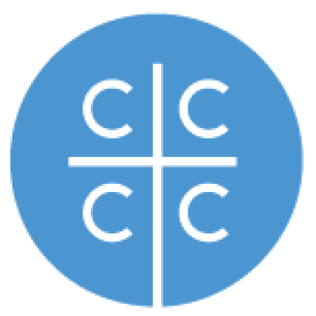Related Research Articles

Ecumenism – also called interdenominationalism, or ecumenicalism – is the concept and principle that Christians who belong to different Christian denominations should work together to develop closer relationships among their churches and promote Christian unity. The adjective ecumenical is thus applied to any non-denominational initiative that encourages greater cooperation and union among Christian denominations and churches.

The Presbyterian Church in America (PCA) is the second-largest Presbyterian church body, behind the Presbyterian Church (USA), and the largest conservative Calvinist denomination in the United States. The PCA is Reformed in theology and presbyterian in government.

The American Association of Lutheran Churches is a Lutheran church body based in the United States. It was formed on November 7, 1987, as a continuation of the American Lutheran Church denomination, the majority of which merged with the Lutheran Church in America and the Association of Evangelical Lutheran Churches to form the Evangelical Lutheran Church in America. The AALC offices were originally in Bloomington, Minnesota. The national office moved to Fort Wayne, Indiana, in 2007, and to Saint Paul, Minnesota, in 2022. In 2008, it had 67 congregations, with about 16,000 members. In 2020, the denomination listed 59 congregations. Its current Presiding Pastor is the Rev. Dr. Cary G. Larson.

The World Evangelical Alliance (WEA) is an interdenominational organization of evangelical Christian churches with 600 million adherents that was founded in 1846 in London, England, to unite evangelicals worldwide. WEA is the largest international organization of evangelical churches. It has offices at the United Nations in New York City, Geneva, and Bonn. It brings together nine regional and 143 national evangelical alliances of churches, and over one hundred member organizations. Moreover, a number of international evangelical denominations are members of the WEA. As of March 2021, the Secretary General of the WEA is German theologian Thomas Schirrmacher.

The Christian Reformed Church in North America is a Protestant Calvinist Christian denomination in the United States and Canada. Having roots in the Dutch Reformed Church of the Netherlands, the Christian Reformed Church was founded by Dutch immigrants in 1857 and is theologically Calvinist.

The Evangelical Free Church of America (EFCA) is an evangelical Christian denomination in the Radical Pietistic tradition. The EFCA was formed in 1950 from the merger of the Swedish Evangelical Free Church and the Norwegian-Danish Evangelical Free Church Association. It is affiliated with the International Federation of Free Evangelical Churches.

The Concordia Lutheran Conference (CLC) is a small organization of Lutheran churches in the United States which formed in 1956. It was a reorganization of some of the churches of the Orthodox Lutheran Conference (OLC), which had been formed in September 1951, in Okabena, Minnesota, following a break with Lutheran Church–Missouri Synod (LCMS). It is the remaining successor of the Orthodox Lutheran Conference. The current president is David T. Mensing, pastor of Peace Evangelical Lutheran Church in Oak Forest, Illinois. All members of the board of directors serve one year terms. The CLC has five congregations and is in fellowship with nine mission congregations in Russia and Nigeria.
The United Evangelical Lutheran Church was one of the many denominations formed when Lutherans came to the United States from Europe. Originally known as the United Danish Evangelical Lutheran Church, the United Church merged with other Lutheran groups to form the American Lutheran Church in 1960, which endured until 1988.
John Clement Whitcomb Jr. was an American theologian and young Earth creationist. Along with Henry M. Morris, he wrote The Genesis Flood, which influenced many conservative American Christians to adopt flood geology.

Wycliffe College is an evangelical graduate school of theology of the University of Toronto. Founded in 1877 as an evangelical seminary in the Anglican tradition, Wycliffe College today attracts students from many Christian denominations from around the world. As a founding member of the Toronto School of Theology, students can avail themselves of the wide range of courses from Canada's largest ecumenical consortium. Wycliffe College trains those pursuing ministry in the church and in the world, as well as those preparing for academic careers of scholarship and teaching.
Matthias Loy was an American Lutheran theologian in the Evangelical Lutheran Joint Synod of Ohio. Loy was a prominent pastor, editor, author, and hymnist who served as president of Capital University in Columbus, Ohio.

The Conservative Congregational Christian Conference is a Congregationalist denomination of Protestant Christianity that is based in the United States. It is the most conservative and oldest Congregationalist denomination in America following the dissolution of the Congregational Christian Churches. It is a member of the World Evangelical Congregational Fellowship and the National Association of Evangelicals.

The World Reformed Fellowship (WRF) is an ecumenical, Christian fellowship that advances partnerships among confessional Reformed churches around the world.
Free grace theology is a Christian soteriological view which holds that the only condition of salvation is faith, excluding good works and perseverance, holding to eternal security. Free grace advocates believe that good works are not necessary to merit, to maintain or to prove salvation, but rather are part of discipleship and the basis for receiving eternal rewards. This soteriological view distinguishes between salvation and discipleship – the call to believe in Christ as Savior and to receive the gift of eternal life, and the call to follow Christ and become an obedient disciple, respectively. Free grace theologians emphasize the absolute freeness of salvation and the possibility of full assurance that is not grounded upon personal performance. Thus, Free Grace theology allows for the salvation of an individual despite moral failings, although the disobedient Christian will face divine discipline. Norman Geisler has divided this view into a moderate form and a more radical form. The moderate form being associated with Charles Ryrie and the strong form with Zane Hodges.
The Theological Commission of the World Evangelical Alliance (WEA) was established in 1974 with Bruce Nicholls as director and John Langlois as administrator. It was built upon the Theological Assistance Program (TAP) which had been created following a decision of WEF in May 1968 to support and strengthen theological education in the Third World.

The Reformed Evangelical Church of Indonesia, abbreviated GRII, also Indonesian Reformed Evangelical Church (IREC), is a Reformed Christian church that is headquartered in Jakarta, Indonesia. It was founded by Stephen Tong, a Chinese-born Indonesian evangelist.

Thomas Torrance (1871–1959) was a Scottish Presbyterian minister and Protestant missionary to Sichuan, western China. He was first sent there by the China Inland Mission (CIM), and later by The American Bible Society. He married Annie Elizabeth Sharpe (1883–1980) of the CIM in 1911. He was the father of the 20th century theologian, Thomas F. Torrance.
The European Journal of Theology is a biannual peer-reviewed academic journal covering evangelical theology. Contributions are in English, French, or German, with summaries in all three languages. The journal was established in 1992 and is published by Amsterdam University Press on behalf of the Fellowship of European Evangelical Theologians. The editor-in-chief is Pieter J. Lalleman. Previous editors have been Nigel M. de S. Cameron, J. Gordon McConville, Mark W. Elliott, and Jamie Grant.
Beatriz Melano was a Uruguayan, Protestant theologian from Buenos Aires, Argentina. Melano is the first known, Protestant woman in Latin America to earn a doctorate in theology. Her participation in international theological conferences established a foundation for future women and Latin American theologians. Melano's books, articles, and presentations on a wide range of theological topics contributed to Latin American feminist and liberation theology. Her influence as a theologian extended beyond Latin America to the United States and Europe. In 1994, a meeting of "Women Professors of Theology" honored Melano as the first woman to be a professor of theology in Latin America.
References
- ↑ Konference evropských evangelikálních teologů v Praze : Náboženský infoservis, 14. 9. 2024 (cs)
- 1 2 https://feet-europe.org/about FEET, oficial page : About
- ↑ https://feet-europe.org/conferences FEET, official page : Conferences
- ↑ FEET Conference – 28-29 August : European Council for Theological Education